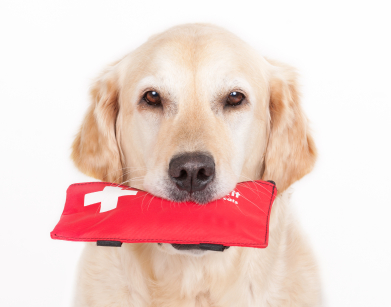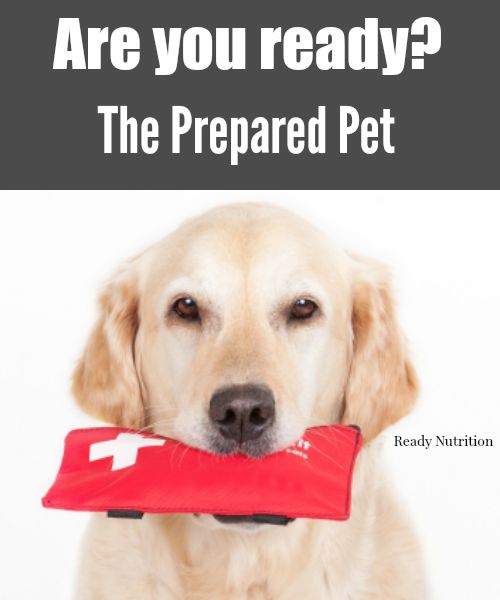 Pets should not be overlooked when acquiring short- and long-term emergency supplies. Our loyal furry and feathered friends make their ways into our hearts and become members of the family.
Pets should not be overlooked when acquiring short- and long-term emergency supplies. Our loyal furry and feathered friends make their ways into our hearts and become members of the family.
It is important to take their needs into account when you are creating a disaster plan and stocking up for your family.
Plan Ahead for Pet Disaster Needs
Many of the most vital steps for keeping your pet safe and healthy during a disaster take place well before a crisis is anywhere on the horizon.
- Locate an emergency shelter ahead of time. For public health reasons, many emergency shelters cannot accept pets. Find out which motels and hotels in the area to which you plan to evacuate will allow pets. Do this well in advance of needing the accommodations. In the event of an emergency, it’s one less thing to worry about. There are also a number of guides that list hotels/motels that permit pets and could serve as a starting point. (This website offers pet-friendly listings by state.) Include your local animal shelter’s number in your list of emergency numbers — they might be able to provide information concerning pets during a disaster.
- Ensure that you have a supply of food and water for each pet. Start off with at least a two-week supply for each animal. Keep in mind that pets can often drink water that would make humans sick.
- Create an evacuation kit for your pet. While the sun is still shining, consider packing a “pet survival” kit which could be easily deployed if disaster hits. Include pet food, bottled water, medications, veterinary records (particularly vaccination records in the event your pet must be kenneled), cat litter/pan, can opener, food dishes, an animal first aid kit, and security items like a favorite toy or blanket. This article has an in-depth list of the supplies you need for your furry friends.
- Make sure identification tags are up to date and securely fastened to your pet’s collar. If possible, attach the address and/or phone number of your evacuation site. If your pet gets lost, his tag is his ticket home. You can order custom pet ID tags for less than $5.
- Make sure you have a current photo of your pet for identification purposes. In the event that you and your pet become separated, you may have to prove that he’s yours.
- Be prepared to securely contain your pet. Make sure you have a secure pet carrier, leash or harness for your pet so that if he panics, he can’t escape.
- Learn more about caring for your pet in the event of an emergency. FEMA offers a video called Preparing Makes Sense for Pet Owners with proactive measures you can take well before an emergency is on the horizon. The Red Cross offers pet first aid classes and this pet first aid manual.
During a Disaster
If a disaster strikes, even the most well-behaved pet can become afraid and behave uncharacteristically. In the event of an emergency, follow these tips:
- Bring your pets inside immediately.
- Have newspapers on hand for sanitary purposes. Feed the animals moist or canned food so they will need less water to drink.
- Animals have instincts about severe weather changes and will often isolate themselves if they are afraid. Bringing them inside early can stop them from running away. Never leave a pet outside or tied up during a storm.
- Separate dogs and cats. Even if your dogs and cats normally get along, the anxiety of an emergency situation can cause pets to act irrationally. Keep small pets away from cats and dogs.
- On the same venue, keep pets and children separated. Fear and anxiety can cause the most gentle pet to bite, scratch, or snap.
- Cover the cages of birds and small mammals like guinea pigs or hamsters.
If You Must Leave Your Home
Although many of us plan to shelter in place in the event of an emergency, it’s important to be prepared to evacuate if necessary.
- Call your local emergency management office, animal shelter, or animal control office to get advice and information.
- If you are unable to return to your home right away, you may need to board your pet. Find out where pet boarding facilities are located. Be sure to research some outside your local area in case local facilities close. If possible, have a relationship with a local kennel ahead of time. This way, your pet’s veterinary records will already be on file there.
- In the event you must use a different kennel than you normally do, you must have your pet’s veterinary records on hand. Most boarding kennels, veterinarians, and animal shelters will require documentation that all vaccinations are current, including bordetella (kennel cough). Include copies in your “pet survival” kit along with a photo of your pet.
- Some animal shelters will provide temporary foster care for owned pets in times of disaster, but this should be considered only as a last resort. Often a shelter could expose your pet to diseases.
- In an emergency, you may have to take your birds with you. Have a portable cage available for travel and be sure they have access to food and water. Make sure that the bird is caged securely and that the cage is covered by a thin cloth or sheet to provide security and filtered light.
If You Must Leave Your Pet at Home
Leaving your pet at home alone during an emergency can place him in grave danger. If evacuation becomes necessary, every effort should be made to bring them along.
If you have absolutely no alternative but to leave your pet at home, there are some precautions you must take.
- NEVER leave your pet chained outside.
- Leave them loose inside your home with food and plenty of water. Do not confine them to a crate.
- Remove the toilet tank lid, raise the seat and brace the bathroom door open so they can drink.
- Place a notice outside in a visible area, advising what pets are in the house and where they are located. (You can get these decals to place in your windows)On the note, provide a phone number where you or another contact who can be reached, as well as the name and number of your vet.
After a Disaster
The danger doesn’t end with the disaster itself. There are also perils during the aftermath of the event.
- If after a disaster you have to leave town, take your pets with you. Pets are unlikely to survive on their own.
- In the first few days after the disaster, leash your pets when they go outside. Always maintain close contact. Familiar scents and landmarks may be altered and your pet may become confused and lost. After a disaster, frightened pets may run away and become separated from their owners. Having emergency information or emergency identification cards on each pet could help you find each other faster.
- If the disaster was a flood, snakes and other dangerous animals may be brought into the area with flood waters.
- Keep pets away from downed power lines.
- After a fire, many animals, including predators, are pushed out of their homes in the forest to suburban areas. Be very cautious when allowing your pets out at night.
- The behavior of your pets may change after an emergency. Normally quiet and friendly pets may become aggressive or defensive. Watch animals closely and keep them separate from children until they’ve reclaimed their normal demeanor.
To conclude, if children are worried about a beloved pet, a crisis situation will become even more traumatic for them. Ensuring our pets are as safe as the humans will help all family members cope with the stressful situation.


Thanks…!
What to do with my chickens? I cannot bring all 13 of them inside. What do you suggest?
Thanks!
I have a pet lizard (Bearded Dragon) what should I do?????
I am not an expert on Bearded Dragons, but I believe that they have freeze dried food for reptiles at Pet Stores. I know that I have seen crickets. Perhaps you can ask the Pet Store this question and they can direct you better than I.
Thanks for your question,
Tess
CKDC – Recently i have been so very lacking in money and debits were eating me from everywhere! that was Until I learned to generate money on the INTERNET! I landed on surveymoneymaker p net, and started filling in surveys for money, and surely I’ve been really more able to get around financialy! I am very glad I did this! With all the financial stress these years, I really hope all of you will give it a chance. Oy4